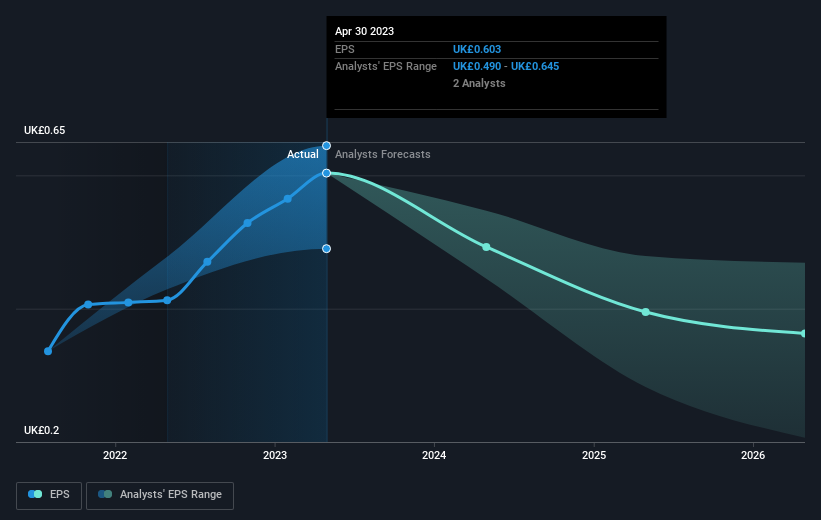Stock Analysis
- United Kingdom
- /
- Transportation
- /
- LSE:ZIG
The 78% return delivered to Redde Northgate's (LON:REDD) shareholders actually lagged YoY earnings growth

One simple way to benefit from the stock market is to buy an index fund. But many of us dare to dream of bigger returns, and build a portfolio ourselves. Just take a look at Redde Northgate plc (LON:REDD), which is up 51%, over three years, soundly beating the market return of 0.8% (not including dividends). However, more recent returns haven't been as impressive as that, with the stock returning just 2.3% in the last year , including dividends .
Since the stock has added UK£50m to its market cap in the past week alone, let's see if underlying performance has been driving long-term returns.
Check out our latest analysis for Redde Northgate
In his essay The Superinvestors of Graham-and-Doddsville Warren Buffett described how share prices do not always rationally reflect the value of a business. One flawed but reasonable way to assess how sentiment around a company has changed is to compare the earnings per share (EPS) with the share price.
During three years of share price growth, Redde Northgate achieved compound earnings per share growth of 131% per year. The average annual share price increase of 15% is actually lower than the EPS growth. So one could reasonably conclude that the market has cooled on the stock. This cautious sentiment is reflected in its (fairly low) P/E ratio of 6.17.
You can see below how EPS has changed over time (discover the exact values by clicking on the image).

It's good to see that there was some significant insider buying in the last three months. That's a positive. That said, we think earnings and revenue growth trends are even more important factors to consider. Before buying or selling a stock, we always recommend a close examination of historic growth trends, available here..
What About Dividends?
As well as measuring the share price return, investors should also consider the total shareholder return (TSR). The TSR incorporates the value of any spin-offs or discounted capital raisings, along with any dividends, based on the assumption that the dividends are reinvested. It's fair to say that the TSR gives a more complete picture for stocks that pay a dividend. As it happens, Redde Northgate's TSR for the last 3 years was 78%, which exceeds the share price return mentioned earlier. And there's no prize for guessing that the dividend payments largely explain the divergence!
A Different Perspective
We're pleased to report that Redde Northgate shareholders have received a total shareholder return of 2.3% over one year. And that does include the dividend. Having said that, the five-year TSR of 6% a year, is even better. Potential buyers might understandably feel they've missed the opportunity, but it's always possible business is still firing on all cylinders. It's always interesting to track share price performance over the longer term. But to understand Redde Northgate better, we need to consider many other factors. Like risks, for instance. Every company has them, and we've spotted 3 warning signs for Redde Northgate (of which 2 are significant!) you should know about.
There are plenty of other companies that have insiders buying up shares. You probably do not want to miss this free list of growing companies that insiders are buying.
Please note, the market returns quoted in this article reflect the market weighted average returns of stocks that currently trade on British exchanges.
Valuation is complex, but we're helping make it simple.
Find out whether Zigup is potentially over or undervalued by checking out our comprehensive analysis, which includes fair value estimates, risks and warnings, dividends, insider transactions and financial health.
View the Free AnalysisHave feedback on this article? Concerned about the content? Get in touch with us directly. Alternatively, email editorial-team (at) simplywallst.com.
This article by Simply Wall St is general in nature. We provide commentary based on historical data and analyst forecasts only using an unbiased methodology and our articles are not intended to be financial advice. It does not constitute a recommendation to buy or sell any stock, and does not take account of your objectives, or your financial situation. We aim to bring you long-term focused analysis driven by fundamental data. Note that our analysis may not factor in the latest price-sensitive company announcements or qualitative material. Simply Wall St has no position in any stocks mentioned.
About LSE:ZIG
Zigup
Provides mobility solutions and automotive services in the United Kingdom, Spain, and Ireland.
Established dividend payer and fair value.

